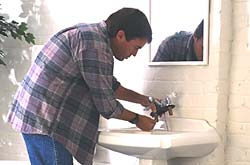Septic and Drain Services
See if We Have Top-Rated
Plumbing Contractors in Your Area

While many homeowners depend on municipal services to handle their sewage issues, those who own a home where a septic tank handles wastewater are responsible for their own wastewater issues. You can, of course, hire a professional to handle septic tank testing and septic tank treatments, but even a professional will have a difficult time (and pass it on to you in the form of a higher bill!) if he or she isn't called in at regular intervals. Septic tank treatments are a must if you want to keep your system running smoothly, and septic tank testing is a necessity for anyone who wants to keep their problems and service bills at a minimum. To help you maintain a system that functions well for as long as possible, here are a tips on what treatments and tests should be performed, and how often they will be required.
Septic Tank Treatments: What They Do and When to Perform Them
Septic systems are responsible for handling all the water that leaves your house; this water contains many contaminants that not only build up in the tank itself, but on the insides of the pipes leading to and exiting the tank. Since the lines and tanks are buried, keeping them clear is a difficult job without the right tools, and in this case, the best tools for the job are microorganisms. Septic tank treatments are basically a mixture of different microorganisms that literally eat away the sludge and deposits that accumulate throughout the system. When introduced into a system regularly, septic tank treatments keep all the wastewater lines clear and the tank functioning with high efficiency.
A single septic tank treatment is not likely to solve the problems of a system that has been long neglected, so it is in your best interests to maintain a regular treatment schedule. The most effective frequency of septic tank treatments is determined by the size of your tank and the number of people living in your home, and different treatment products suggest different frequencies for their use. Since septic tank treatments work by introducing living organisms into your system, it is important to be aware that some common items (especially cleaning products) may inadvertently kill these organisms, rendering the treatment less effective. In most cases, the product you use for septic tank treatment will be labeled to tell you which chemicals will interact negatively with the product.
Septic Tank Pumping
Septic system treatments can certainly go a long way, but it is also a good idea to have your system pumped every two to five years, depending on where you live, the size of the tank, and the number of people in the household. One of the best things you can do for your septic system is to hire a septic and drain service contractor who can professionally inspect the condition of your septic tank when it's pumped. More than just a tank pumping, this inspection can identify problems with your septic tank baffles (the most common cause of failure in septic systems). Corrosion, cracking, or rusting is common after a number of years of septic service and early identification will prevent complete failure than can cost you thousands of extra dollars.
Water in your basement? Use this link for a new
Basement Remodel
Septic Tank Testing
Because septic systems are hidden underground, septic issues are often not noticed until problems become out of control. While septic tank testing is a must when purchasing a home that uses a septic system, yearly testing is also a good idea for anyone who wants to avoid the high cost of tank and drainage replacement. Some courageous homeowner have taken the plunge into DIY septic system testing, but for most of us, calling in a professional for this task is a far more inviting prospect.
Professional septic tank testing is a relatively small expense, especially when you consider the thousands of dollars it costs to remove and replace an entire system. However, since he or she will probably charge an hourly rate, testing goes more smoothly and costs less money if you can lead your service provider directly to the tank. If you don't know where your septic system is, it is worth the time to have someone mark it. Some septic tanks are made of plastic, which is susceptible to damage when weighed down. Identifying where your septic tank sits will not only make testing and pumping faster and less costly, it will also prevent some pretty messy issues that can result when that area of your property is driven over by heavy machinery or parked on!
More Tips & Advice For Your Home
- Recent Articles

